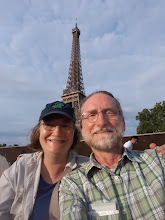Doubles
I have an “every woman” face. About twice a year, perfect strangers will approach Jonathan and me to comment that they have a friend or relative that look so much like me that they could be my sister. After years of this, Jonathan just grins, and I restrain myself from telling them that these resemblance questions happen all the time.In addition, if I refrain from speaking, many people don’t think I’m American. In Ukraine and Germany, I’ve passed quite easily as a local. Hong Kong was a different story, but even there, many people thought I was British.
___
Certain words in Ukrainian have a broader meaning than their counterparts in English. For example, babuschka signifies “older woman,” and its diminutive babka means “Grandma.” But our children often use both terms to mean “older woman”; for example, if we’re downtown and they see a white-haired woman walking down the street, even in English they’ll call her a “grandma.” The same situation exists for the word mama, which the kids use to address me as well as any other female caretaker.
___
People tell me that my sister and I bear a striking resemblance to each other. Jonathan just smiles at those comments, too. During her recent visit, she and I attended the FRUA winter banquet along with six of our combined children. (FRUA is a support organization serving “Families for Russian and Ukrainian Adoption.”) Because we took a long time to register, check our coats, and make the obligatory bathroom stop, we arrived late and could not sit together at one table. My sister found a place with four of the children, and I sat elsewhere with Kola and David.
During the entertainment portion of the event, Kola's attention span wavered, and he looked for something else to do. He pointed across the room at my sister and asked if he could sit with her for awhile:
“Mama, ja hochish drua mama!”
(Mama, I want the second mama!)


0 Comments:
Post a Comment
<< Home